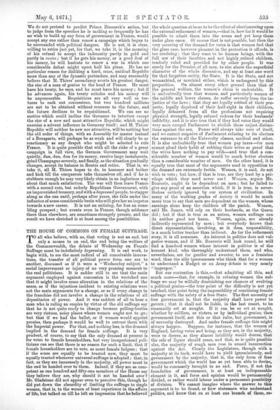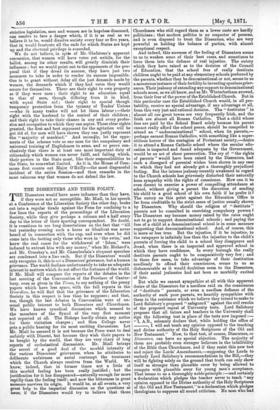THE HOUSE OF COMMONS ON FEMALE SUITILAGE.
TO all who believe, with us, that voting is not an end, but only a means to an end, the end being the welfare of the Commonwealth, the debate of Wednesday on Female Suffrage must be indefinitely depressing. It is sad work, to begin with, to see the most radical of all conceivable innova- tions, the transfer of all political power from one sex to another, discussed as if it were a "Wednesday subject," a social improvement or injury of no very pressing moment to the real politicians. It is sadder still to see that the main argument employed against concession is the wretched one that it might involve some alteration in the relations of the sexes, as if the injustices incident to existing relations were not the main arguments for a change, or as if every change in the franchise did not involve a change in the relations of all depositaries of power. And it was saddest of all to hear a man who is ruling an empire by virtue of the old suffrage say that he is not quite ready to change because polling-booths are very riotous, noisy places where women ought not to go ; but that if we had the ballot, or if women would appoint proxies, then perhaps it would be well to entrust them with the Imperial power. For that, and nothing less, is the demand implied in the demand for female suffrage. It is very prudent, of course, to say that the only demand at present is for votes to female householders, but very inexperienced poli- ticians can see that there is no reason for such a limit, that if female householders are to vote, so must female lodgers ; that if the sexes are equally to be trusted now, they must be equally trusted whenever universal suffrage is adopted ; that, in fact, as they are immensely in the majority, all power must in the end be handed over to them. Indeed, if they are as com- petent as one hundred and fifty-one members of the House say they believe they are, why should it not be handed over? Mr. Gladstone did not appear even to perceive this, though he did put down the absurdity of limiting the suffrage to single women, that is, to the women of least experience in the affairs of life, but talked on till he left an impression that he believed the whole question at issue to be the effect of electioneering upon the external refinement of women,—that is, how far it would be possible to admit them into the arena and yet keep them under glass cases. Of course that is not possible, but then the very meaning of the demand for votes is that women feel that the glass case, however pleasant in the protection it affords, is too confining • that they want to be human beings, with the full use of their faculties, and not highly.refined children, tenderly ruled and provided for by other people. It was surely for the Premier, of all men, to rise above the superficial character of the whole discussion, and say at least one word for that forgotten entity, the State. It is the State, and not womankind, or mankind either, which is endangered by this proposition. On almost every other ground than that of the general welfare, the women's claim is undeniable. It is undoubtedly true that women, and particularly women of the middle and lower classes, do suffer severely from the in- justice of the laws ; that they are legally robbed of their pro- perty, legally deprived of their half-right in their children, legally debarred from all the professions not requiring physical strength, legally refused redress for their hushands' infidelity, and it is also true that if they had votes they would very soon compel Parliament to abolish these unjust distinc- tions against the sex. Power will always take care of itself, and we cannot conpeive of Parliament refusing to its electors the entrance to all the University classes, medical and other. It is also undoubtedly true that women pay taxes—for men cannot plead their habit of robbing their wives as proof that the wives have nothing to pay with—and true that a con- siderable. number of women would be much better electors than a considerable number of men. On the other hand, it is equally true that most of the arguments used in opposition to the demand are extremely feeble. Women, it is said, do not wish to vote ; but how, if that is true, are they hurt by a pri- vilege which they need never use ? Women, argues Mr. Bouverie, ought to be dependent on men ; but he failed to give any proof of an assertion which, if it is true, is never- theless entirely ignored by our system of civilization. In many of the working grades of society it would be much more true to say that men are dependent on the women, whose earnings alone keep the children off the parish. Women, said Mr. James, will rely on their husbands, as the Queen did ; but if that is true as an axiom, women suffrage can do neither good nor harm. Women, again, are already indirectly represented by men ; but everybody knows that direct representation, involving, as it does, responsibility,. is a much better teacher than indirect. As for the refinement story, it is all nonsense. An interest in politics does not vul- garize women, and if Mr. Bouverie will look round, he will find a hundred women whose interest in politics is of the keenest kind, who thoroughly understand them, and who,. nevertheless, are far gentler and sweeter, to use a feminine word, than the silly ignoramuses who think that for a woman, to understand a Budget or an Army debate is very nearly "improper."
But our contention is this,—that admitting all this, and much more—that, for example, in refusing women the suf- frage we may be wilfully diminishing our chances of evolving a political genius—the true point of the difficulty is not yet touched, that point being the impossibility of combining female suffrage with the safety of a free State. The first necessity of free government is, that the majority shall have power to govern • that it shall not be liable, in the last resort, to be summarily 'set at nought. If it can be so set at nought, whether by soldiers, or rioters, or by individual genius, then government itself, not this or that ruler, but government, is of necessity destroyed. And under female suffrage this might always happen. Suppose, for instance, that the women of England, having votes and being, as they are, in the majority, were to decree, as they almost infallibly would decree, that the sale of liquor should cease, and that, as is quite possible also, the majority of rough men rose in armed insurrection against the Act. Clearly the Legislature, though with a majority at its back, would have to yield ignominiously, and government by the majority, that is, the only form of free government which the world has as yet been able to devise, would be summarily brought to an end. Force, if not the foundation of government, is at least an indispensable element in it, and force and opinion would be permanently divided, or rather would labour under a permanent possibility of division. We cannot imagine where the answer to this argument is to be found, or how statesmen who understand politics, and know that on at least one branch of them, re-
strictive legislation, men and women are in hopeless disaccord, can resolve to face a danger which, if it is as real as we believe it to be, would dissolve society every four or five years, that is; would frustrate all the ends for which States are kept up and the electoral privilege is conceded. We do not believe, in spite of Mr. Gladstone's apparent conversion, that women will have votes yet awhile, for the ballot, among its other results, will greatly diminish their influence ; but we would point out to the opponents of the pro- posal that if they dread its success, they have just two measures to take in order to render its success impossible. One is to grant without delay all the just demands made by women, the demands which if they had votes they would secure for themselves. These are their right to own property as if they were men ; their right to an education equal to that of men, though differing from it in kind, with equal State aid ; their right to special though temporary protection from the tyranny of Trades' Unions —who in many trades will not let them labour ;—their right with the husband to the control of their children ; and their right to take their chance in any and every profes- sion and occupation to which they can aspire. Those clear rights granted, the first and best argument for the agitation will be got rid of, for men will have shown they can justly represent the "majority of mankind." And secondly, let the oppo- nents of the scheme vote as one man for the compulsory and universal training of Englishmen to arms, and so prove con- clusively that there is at least one most important duty of citizenship which women can never fulfil, and failing which, their powers in the State must, like their responsibilities to the State, be somewhat limited. As it is, the House of Com- mons first counts out Major O'Reilly—the most disgraceful incident of the entire Session—and then remarks in the most valorous way that women do not defend the law.

































 Previous page
Previous page